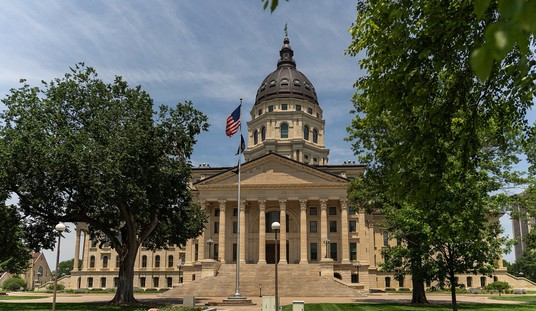A few days ago, a Flake-changed-in-the-Senate hypothesis was put forward but I’m not so sure about this big change in the Arizona Senator. After all, he still had an 80% ACU rating in the Senate, which is surely down from the 90s while in the House, but 4 out of 5 does not a liberal make. In my opinion, Michael Barone made a more persuasive case.
Flake, R-Ariz., in his 12 years in the House and five years in the Senate has taken consistent views. His strong free-market conservatism on economic issues led him to oppose former President George W. Bush’s Medicare prescription drug bill and TARP legislation, as well as the 2001-02 No Child Left Behind bill. He supported “comprehensive” immigration legislation in the House (for which John Boehner booted him from the Judiciary Committee) and in the Senate (as a member of the “Gang of Eight”).
Domenech’s point is that he bucked the Republican leadership in the House and not in the Senate, but in both cases he was acting in accordance with his own principles. Which are in line with the principles of those of the Church of Jesus Christ of the Latter-Day Saints and the great bulk of its believers.
[…]
Flake has taken serious electoral risks in sticking to his guns in both the House and the Senate. When he ran for re-election in 2006, after renouncing a three-term-limit pledge, he was opposed by local mayors who said he wasn’t bringing them pork barrel spending. When he ran for the Senate in 2012, his position on immigration may account for the fact that he won the general election by only 49 to 46 percent, even as Mitt Romney was carrying Arizona 53 to 44 percent.
This strikes me as more true. It’s probably also true that Flake would have better represented Utah than Arizona. Generally speaking, unless there’s a Damascus moment, a 30-year old doesn’t change his or her beliefs all that much 25 years later. At least, that’s my personal experience and my political observations talking. What does change are political parties, and the GOP did change. In 1992, after four years of GHW Bush, the GOP was still the Party of Reagan in both tenor and policy. Today, the GOP is the Party of Buchanan.
A quarter-century before Trump descended into the atrium of his Manhattan skyscraper to launch his unlikely bid for the White House, Buchanan, until then a columnist, political operative and TV commentator, stepped onto a stage in Concord, New Hampshire, to declare his own candidacy 10 weeks ahead of the state’s presidential primary. Associating the “globalist” President George H. W. Bush with “bureaucrats in Brussels” pursuing a “European superstate” that trampled on national identity, Buchanan warned his rowdy audience, “We must not trade in our sovereignty for a cushioned seat at the head table of anybody’s new world order!” His radically different prescription, which would underpin three consecutive runs for the presidency: a “new nationalism” that would focus on “forgotten Americans” left behind by bad trade deals, open-border immigration policies and foreign adventurism. His voice booming, Buchanan demanded: “Should the United States be required to carry indefinitely the full burden of defending rich and prosperous allies who take America’s generosity for granted as they invade our markets?”
Trump’s comments on free trade, immigration and foreign policy are hardly different from those espoused by the former Nixon speechwriter.
All the ideas that seemed original to Trump’s campaign could, in fact, be attributed to Buchanan—from depicting the political class as bumbling stooges to singling out a rising superpower as an economic menace (though back then it was Japan, not China) to rallying the citizenry to “take back” a country whose destiny they no longer dictated. “Pitchfork Pat,” as he was nicknamed, even deployed a phrase that combined Trump’s two signature slogans: “Make America First Again.”
“Pat was the pioneer of the vision that Trump ran on and won on,” says Greg Mueller, who served as Buchanan’s communications director on the 1992 and 1996 campaigns and remains a close friend. Michael Kinsley, the liberal former New Republic editor who co-hosted CNN’s “Crossfire” with Buchanan, likewise credits his old sparring partner with laying the intellectual groundwork for Trumpism: “It’s unclear where this Trump thing goes, but Pat deserves some of the credit.” He pauses. “Or some of the blame.”
Where Pat had his pitchfork, Trump has his Twitter. What was rejected by over three-quarters of the GOP a quarter century ago was the winning message in the 2016 primaries. In 1992, Buchanan challenged GHW Bush in the Republican primaries but never won a state and got less than a quarter of the primary vote. Today, Buchanan is ascendant in the body of Trump. To me, that’s a huge change in the party. It was enough of a change for me leave it four years ago and go independent because I saw where it was going. I lost the argument.
The other change was tenor. In 1992, there was an 11th Commandment, but that was nuked last year. Reagan was passionate but seldom angry, but for a famous exception.
https://youtu.be/bflCPXrU4s0
Today, there’s a lot of anger in Trump’s tweets. Reagan negotiated with Tip O’Neill while Trump took Schumer/Pelosi’s first offer. There was more compromise then. Today, it’s about not budging. We used to be known as the Daddy Party and the Dems the Mommy Party. Today, it seems like the GOP is the Emotional Party. The party has changed, and not for the better, IMO, and I don’t see the situation improving. To date, Trump has not showed himself to be a uniter and I don’t see that changing either,












Join the conversation as a VIP Member